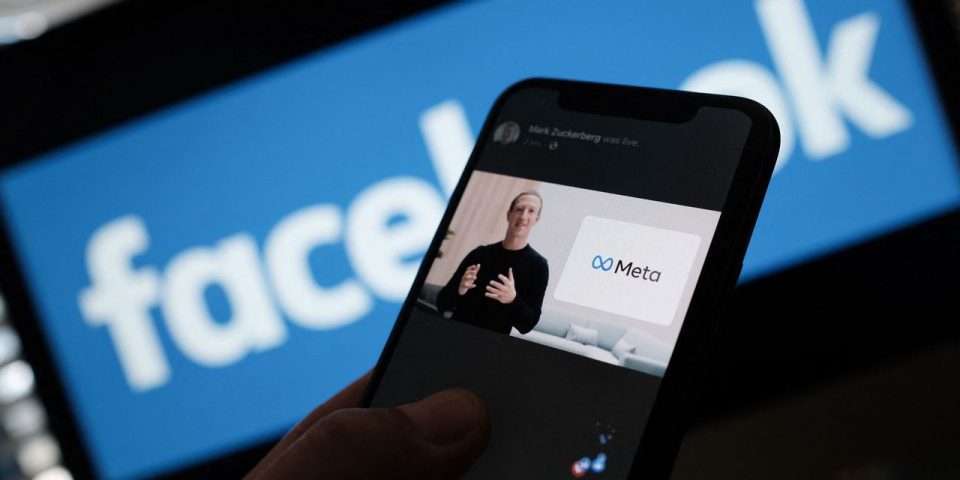
Shares of Facebook-parent Meta Platforms plummeted in late trading Wednesday after the company offered a surprisingly weak outlook for its first quarter.
CHRIS DELMAS/AFP via Getty Images
Text size
And just like that, Mark Zuckerberg and
Meta Platforms
blew up the internet sector.
In reporting fourth-quarter results late Wednesday, the Facebook company (ticker: FB) shocked investors with weak guidance for the March quarter. Facebook said revenue growth could be as low as 3% in the period; in the first quarter a year ago, Facebook’s revenue was up 48%.
That forecast raises questions not just about Meta’s growth outlook but about the broader online advertising industry and shifting consumer behavior. It would appear that Meta is seeing serious issues in its core business—decelerating use of the company’s primary services, tough earnings comparisons, and reduced spending by advertisers who are having issues related to inflation and supply-chain issues. The company also warned about the continued impact of privacy changes in
Apple
‘s iOS mobile software.
The news knocked more than 20% off the price of Meta shares in after-hours trading, and dragged down other social media stocks as well, with
Snap
(SNAP) down 18%, Pinterest (PINS) off 10%, and
Twitter
(TWTR) 8% lower. Other ad-dependent stocks are falling as well, with
The Trade Desk
(TTD) down 10% and Roku (ROKU) 4% lower. Alphabet shares, which had rallied 7.5% in the regular session, are down just 2%.
The main issue is this: Meta sees first-quarter revenue of $27 billion to $29 billion, which would represent growth between 3% and 11% from a year ago. Even the top of the range is well below Wall Street’s consensus forecast of $30.1 billion. At a high level, the company said results will be affected by “headwinds” to both the number of ad impressions and pricing.
The issue with impressions is the biggest shocker—simply put, people seem to be spending less time on Meta’s platforms, which includes Facebook, WhatsApp, Instagram, and Messenger. “On the impressions side, we expect continued headwinds from both increased competition for people’s time and a shift of engagement within our apps towards video surfaces like Reels, which monetize at lower rates than Feed and Stories,” the company said in its earnings press release.
That explanation suggests this is in part a self-inflicted wound by Facebook—the company’s push into video platforms has come in response to the emergence of Bytedance-owned TikTok.
And then there’s the other issue: People seem to be spending more time doing things other than looking at their Facebook and Insta pages. That could reflect people simply spending more time out of the house after two years of severe pandemic restrictions. Alternatively, or perhaps additionally, it could suggest that people are simply growing a little tired of social media, and simply using the platforms less.
On pricing, Meta raised a couple of related issues. One of those is the timing of Apple’s tougher standards on allowing advertisers to track consumer behavior across apps and websites on iOS devices. A year ago, those changes weren’t yet in effect, meaning their impact will still be seen in growth rates during the first quarter. “We anticipate modestly increasing ad targeting and measurement headwinds from platform and regulatory changes,” the company said.
Meta also noted the first quarter will be compared against a year-ago period of “strong demand,” noting that it is “hearing from advertisers that macroeconomic challenges like cost inflation and supply chain disruptions are impacting advertiser budgets.” And finally, the company expects a negative impact from currency exchange rates in the quarter.
What makes this all a little surprising—and harder to sort out—is that just 24 hours ago Google-parent Alphabet (GOOGL) posted better-than-expected results, which triggered a sharp rally in the company’s stock. Alphabet CEO Sundar Pichai said in a statement Tuesday that the company saw “ongoing strong growth” in its advertising business, helping “millions of businesses thrive and find new customers.” And while Meta is complaining about lower monetization in Reels, Alphabet is seeing booming growth in YouTube revenues.
That raises two final questions: Are consumers reducing their use of social media, in general, or just Meta’s platforms, in particular? And are advertisers actually cutting back on spending, or just shifting dollars away from platforms like Facebook’s which have historically been reliant on the user targeting Apple is now trying to prevent?
Wall Street will be searching for the answers in the days ahead.
Write to Eric J. Savitz at [email protected]


